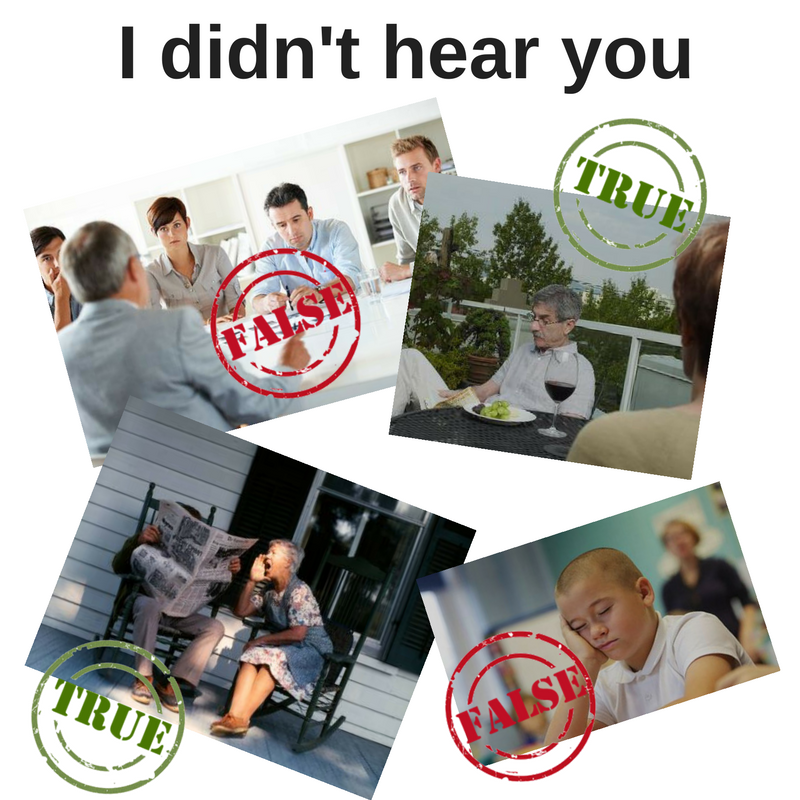|
Selective Hearing. It's a term bandied about as a joke, used to describe the seeming inability of others to hear us speaking. Often, these "others" are our nearest and dearest. Children. Partners. Students. We refer to it as "Selective" hearing because it does, indeed, seem to be sporadic. Sometimes they hear us. Sometimes they don't. If we ask our teenager to take out the garbage, they don't hear us. If we ask them whether to buy dill pickle chips or sour cream and onion, they are quick to reply, "Both!". Interesting phenomenon, eh? But is "Selective Hearing" a real thing? Yes. But it's not a real disorder. "Selective hearing is not known to be a disorder... Under the World Health Organization (WHO), a hearing disorder happens when there is a... loss of hearing in the ears... selective hearing is not "deafness" to a certain sound message. Rather, it is the selectivity of an individual to attend audibly to a sound message. The whole sound message is physically heard by the ear but the idea is the capacity of the mind to systematically filter out unwanted information. Therefore, selective hearing should not be confused as a physiological hearing disorder." (Thank you Wikipedia: https://en.wikipedia.org/wiki/Selective_auditory_attention) Selection implies choice. So, yeah, your teenager may be choosing not to hear you, because they don't want to do their homework or be home by curfew. You've become a part of the undesired sounds they have learned to ignore. But, in some cases, your loved one may not be ignoring you. While there may be a combination of factors at play - Selective Hearing being one of them - when compounded with the early stages of hearing loss, it may be that someone genuinely can't hear you. At UBHearing, we can tell you in as little as 15 minutes whether you are suffering from Selective Hearing or genuine Hearing Loss.
For those who have been tuning out their loved ones, be warned. Proving to have no hearing loss, while a relief to discover, may land you in hot water. For those who feel they are being unfairly nagged, discovering that you do suffer from mild to moderate hearing loss may get you out of the dog house. In fact, you may enjoy a few days of having a contrite partner "making it up to you" for all the years of harping at you about ignoring them. But, more than that, you will have the facts about your hearing health. At UBHearing we never pressure anyone into purchasing hearing aids. In fact, even if you show an interest in hearing aids, we encourage you to try before you buy, so you can experience varying levels of technology and find out what offers the best value for you. Once you choose to buy, even then, you have 90 days after paying for your hearing aids to return or exchange them. As well, for those living with someone who isn't consistently hearing you, consider your own part in the equation. Many of us are guilty of not only being lazy listeners, but lazy speakers too. When speaking to family, we often do so from another room, or with our head stuck in the fridge, buried in a newspaper, or looking down at our phones. This makes it difficult for even those with normal hearing to understand us. If we were on a date, at a job interview, or with an important client, we would never use such sloppy communication strategies. We'd face our listener, maintain eye contact, speak clearly, and look for signals of understanding on the listeners face, patiently ensuring we'd been understood and never placing the whole blame for misunderstanding squarely on the shoulders of the listener. Comments are closed.
|
UBHearing™Affordable Excellence. Archives
January 2024
Categories
All
|
Phone: (613)392-3000
Email: [email protected]
Copyright © 2016-2023 UBHearing Ltd. All Rights Reserved.
Email: [email protected]
Copyright © 2016-2023 UBHearing Ltd. All Rights Reserved.



 RSS Feed
RSS Feed